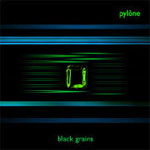
CD, Sound On Probation, 2006
www.soundonprobation.com
Pylône delivers neoteric, but not unfamiliar, abstract environments and minimal dark ambient over five tracks on “Black Grains.” Varying in length from 5 to 25 minutes, each creaking and trembling work of transcendent noise blends nicely with its counterparts. It is irrelevant to discern beginnings from endings on “Black Grains,” and instead better to perceive unique movements in the encompassing whole. Pylône engages numerous metaphorical abstracts in creating this dark ambient vision. It is both the soundtrack of gutted technology and of desolate nuclear winter. It is the seedship left stranded on a distant world and the mournful keening of dead air. “Black Grains” infiltrates machinery abandoned to rust and decay, spoiling the mechanisms of moving parts and corrupting wiring and circuit boards. Sounds perpetually evolve and devolve like indistinct fragments carried on the wind itself.
“Equation Part.1” begins the album with a constant interplay of shivering, metal-on-metal scratches and scrapes, deeper bass tones, and transmissions of crackling static. “Look Part.3” follows with extensive and high-pitched percolations of familiar noise friction that in retrospect seem merely a protracted prelude to the epic “Transmission.” There is constant motion in the latter piece, yet the overall dynamic is quite subtle. The endless static rumblings and shifting turbine stutters mesh smoothly with suspended oscillations that cycle and mutate at a ponderous pace. Deep mechanical fluctuations create textures over empty white noise, eventually morphing into waves of harsh radioactive emissions that throb and click with malefic intent. “Line 4” offers a quieter, restive respite from prior chaotic constructions. Its low humming and high-pitched buzzing, however, are soon superseded by the relentless bubbling and chirping of over-stimulated circuitry, call and response signals, and fuzzily defined feedback that characterizes the closing “Echo.”
[8/10]
— Dutton Hauhart
